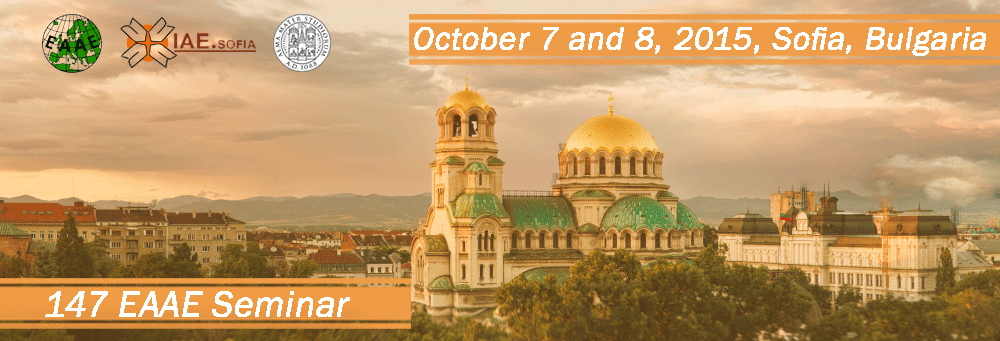147 EAAE Seminar “CAP Impact on Economic Growth and Sustainability of Agriculture and Rural Areas”
Key note speakers presentations
The role of CAP in addressing jobs and growth challenges – Tassos Haniotis (Director, Economic Analysis, DG Agriculture, European Commission)
The impacts of the CAP at the farm level – Prof. Dr. Davide Viaggi (University of Bologna, Italy)
CAP greening measures: Modelling challenges and first results
CAP and Bulgarian Agriculture – Prof. DSc Plamen Mishev (University of National and World Economy)
1. Date and location
Date: October 7 and 8, 2015
Location: Sofia, Bulgaria
Hotel “Expo”, Sofia
2. Theme
In 2015 a new programming period of the CAP with a major reform of policy measures and tools launched. The new CAP seeks to encourage knowledge, innovation and greater competitiveness in order to realize the potential of agriculture and food industry. The purpose of the CAP is to increase the productivity and efficiency of agricultural holdings through support of structural adaptation and income stability. CAP aims to guarantee economic growth and sustainability of agriculture and rural regions in order to reduce poverty, improve quality of life of rural households and prevent depopulation of villages. Contributing to public goods, environmental sustainability and adaptation to climate change is also a purpose of the CAP. Finally, the combination of strong financial support from the CAP and strict requirements in food safety standards is bringing about substantial and rapid changes in the whole sector.
The seminar wants on the one hand to look back in order to assess what have been the impacts of the instruments used by the CAP in the past (both in old and new member countries) and on the other hand by looking forward to evaluate the possible impact of the changes in the new CAP policy.
3. Background
There is a long tradition of analysing the impact of CAP. Economic models suggest that under specific conditions, the CAP could generate economic growth and net benefits for EC member states. In particular, they identify impacts on the economic growth in agriculture and rural regions, restructuring and competitiveness of agricultural holdings, food safety and quality standards for production processes and consumer goods. CAP effects are usually estimated using different methods and approaches: macroeconomic models and/or microeconomic models; for individual countries (country studies with single-country models) and/or for several countries (multi-country models). Beyond traditional economic tools, the analysis of CAP impact incorporates interdisciplinary frameworks including regional economics and sociological approaches. During the seminar we want to assess the results of these models and methodologies and evaluate the impact of past and current CAP policies.
4. Objectives
The objective of the seminar is to provide an overall picture as well as detailed analyses of the past and future CAP impact on the structural reform of the agrarian sector, and its impact on rural areas and food chain development. Interconnection and multiple impact of the CAP on non-agricultural sectors will be also discussed. The seminar brings together agricultural, rural and food economists and sociologists.
5. Topics
The Seminar focuses on the following main topics related to the impact of CAP:
- Structural Changes and Productivity Growth in Agriculture
Structural changes in the agrarian sector
Efficiency, productivity growth and competitiveness
Risk management
Agricultural investments
- Sustainable Rural Development
Unemployment and job creation
Income growth and poverty reduction
Diversification in rural areas
Social instability and social inclusion
- Innovation and Environment
Sustainable intensification of agriculture
Conservation and efficient use of natural resources
Knowledge and innovation for environment
- Interconnections and Multiple Impacts
Cooperation and integration between agriculture and food industry, food chain
Food chain, food safety and food quality
Competition between agriculture and energy markets, land investors and non-agricultural land users
Contribution and adaptation of agriculture to climate change
6. Organisation and program committee
The seminar will be organised jointly by the Institute of Agricultural Economics, Sofia, Bulgaria and the University of Bologna, Italy.
Publication
The Scientific Committee aims to publish a selection of contributed papers, together with the
invited papers in a special proceedings issue.
Confirmed Keynote speakers:
Prof. Dr. Sofia Davidova (Kent Business School, United Kingdom)
Prof. Dr. hab. Andrzej Kowalski (Institute of Agricultural and Food Economics, Poland)
Prof. Dr. hab. Plamen Mishev (University of National and World Economy, Bulgaria)
Prof. Dr. Davide Viaggi (University of Bologna, Italy)
Sen. Res. Dr. Sergio Gomez Y Paloma, Senior Researcher (Institute for Prospective Technological Spain)
Organising committee:
Prof. Dr. Dimitre Nikolov (Institute of Agricultural Economics, Sofia, Bulgaria)
Prof. Dr. Neli Bencheva (Agrarian University, Plovdiv, Bulgaria)
Prof. Dr. Davide Viaggi (University of Bologna, Italy)
Prof. Dr. Basil Manos (Aristotle University, Greece)
Associate Prof. Dr. Monika Tudor (Institute of Agricultural Economics, Romania)
Scientific committee:
Prof. Dr. Dimitre Nikolov (Institute of Agricultural Economics, Bulgaria)
Prof. Dr. Jo Swinnen, Katholieke Universiteit Leuven (Belgium)
Prof. Dr. Davide Viaggi (University of Bologna, Italy)
Prof. Dr. Markus Hanisch (Humboldt University, Germany)
Prof. Dr. Sofia Davidova (Kent Business School, UK)
Prof. Dr. Thomas Glauben, IAMO, Halle (Germany)
Associate Prof. Ing. Tomáš Doucha, CSc. (Institute of Agricultural Economics and Information, Czech Republic)
Prof. Dr. Csaba Csaki (Corvinus University of Budapest, Hungary)
Dr.ir. NBP Nico Polmann (Wageningen University, The Netherlands)
Sen. Res. Dr. Sergio Gomez Y Paloma (Institute for Prospective Technological Studies, Spain)
Prof. Dr. Basil Manos (Aristotle University, Greece)
Prof. Dr. hab. Andrzej Kowalski (Institute of Agricultural and Food Economics, Poland)
7. Important dates
Abstract submission: June 15, 2015
Notification of acceptance: June 30, 2015
Close early registration: July 31, 2015
Final registration: September 15, 2015
Full paper submission: September 15, 2015
Seminar: October 7-8, 2015
